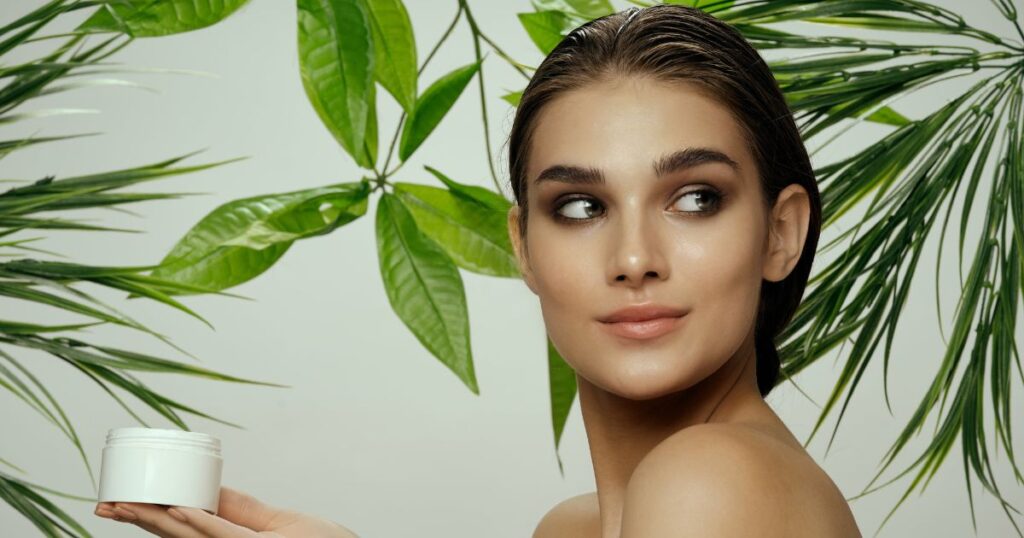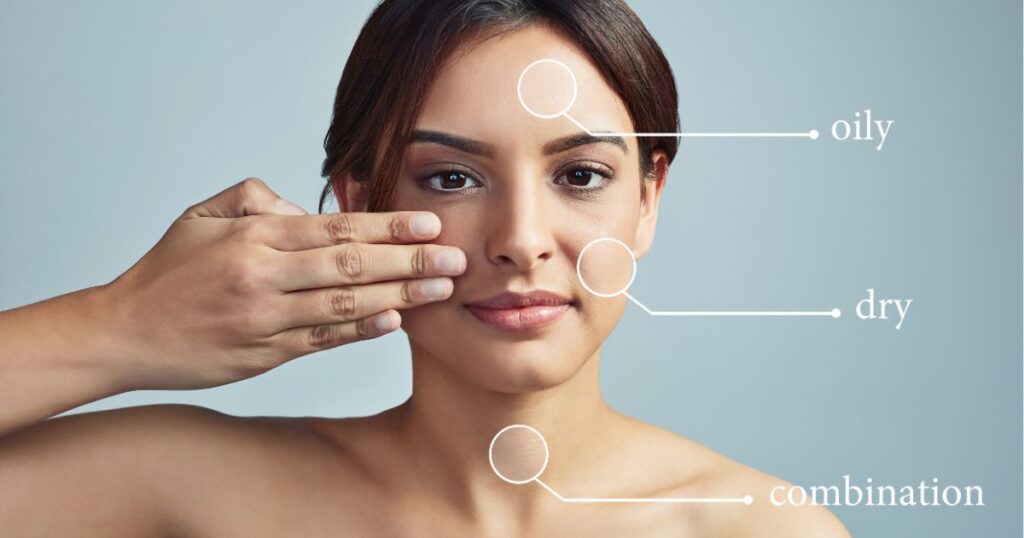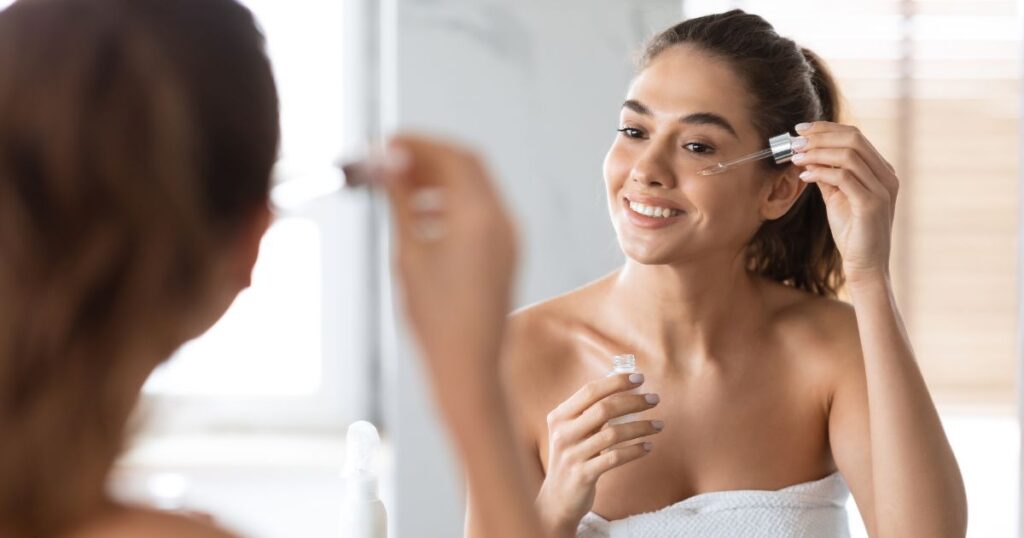Squalane stands at the forefront of the skincare revolution, combining traditional benefits with innovative applications that result in healthier looking skin. This stellar ingredient is integral to the clean beauty movement, known for its remarkable efficacy and commitment to sustainable practices. As skincare enthusiasts seek out products that are both effective and ethical, squalane answers the call with its universal appeal and environmentally conscious sourcing.
Key Highlights of Squalane:
- Natural Derivation: Originating from squalene, which is naturally produced by human skin cells, squalane is a hydrogenated, stabilized form that is ideal for use in skincare products.
- Clean Beauty Champion: Squalane is free from harmful chemicals, sustainable, and ethically sourced. It is primarily derived from plant sources such as:
- Olives
- Rice Bran
- Sugarcane
- Versatile and Effective: Known for its adaptability, squalane is a favorite in a variety of skincare products, from moisturizers to serums, catering to all skin types.
Clean Beauty Angle: Environmental and Ethical Benefits
The shift to plant-derived squalane oil represents a significant advancement in clean beauty:
- Sustainability: By using crops like sugarcane and olives, the beauty industry reduces its reliance on animal sources and minimizes ecological impact.
- Ethical Sourcing: Plant sources ensure that no animals are harmed, aligning with the ethical standards of vegan and cruelty-free beauty.
- Reduced Environmental Footprint: Sustainable farming and harvesting practices for these plants contribute to a smaller environmental footprint compared to animal-derived or chemically synthesized alternatives.
In the context of clean beauty, squalane is not just a functional ingredient but also a testament to the industry’s commitment to sustainability and ethical responsibility. By incorporating squalane into their products, brands can deliver exceptional hydration and skin-smoothing benefits while supporting environmental stewardship and animal welfare.
Table of Contents - Click to Go
Is Squalane Vegan?

Squalane can be derived from both animal and plant sources, making its vegan status dependent on the chosen raw material.
Understanding the Source Material
- Animal-Derived Squalane: Historically, squalane was frequently sourced from shark livers, which is clearly not vegan or sustainable.
- Plant-Derived Squalane: Today, the majority of squalane oil used in clean beauty is sourced from plants like olives, rice bran, and sugarcane. These sources are 100% vegan and are preferred for their ethical and sustainable qualities.
Historical Context and Shift
- From Sharks to Plants: The cosmetic industry has largely moved away from shark-derived squalane due to ethical concerns and the environmental impact of depleting shark populations.
- Innovation in Sourcing: Advances in biotechnology have made it easier and more cost-effective to extract squalane oil from plant sources, facilitating this shift.
Clean Beauty Angle: Cruelty-Free and Ethical
- Cruelty-Free: Plant-derived squalane is completely cruelty-free, aligning with the clean beauty commitment to do no harm to animals.
- Ethical Considerations: Using plant sources supports sustainability and avoids the ethical pitfalls associated with animal harm.
The transition to plant-derived squalane not only addresses vegan concerns but also represents a broader commitment within the clean beauty industry to ethical sourcing and environmental responsibility. By choosing products containing vegan squalane, consumers support these values and contribute to a more humane and sustainable beauty industry.
What are the Benefits of Squalane Oil for Skin?

Squalane is lauded in the skincare community for its remarkable versatility and compatibility with all skin types. This stable compound offers numerous benefits that promote healthier, more resilient skin.
Hydration
Squalane is an exceptional moisturizer. It mimics the skin’s natural oils, providing hydration without clogging pores. This makes it an ideal ingredient for both dry and oily skin types.
- Locks in moisture: Helps to seal in hydration and boost moisture, reducing water loss and keeping the skin cells plump and hydrated.
- Lightweight texture: Unlike many other oils, squalane has a lightweight, non-greasy feel that absorbs into the skin immediately when applied topically.
Antioxidant Properties
Squalane helps protect the skin from the harmful effects of free radicals that contribute to premature aging.
- Fights oxidative stress: Regular use of squalane can help boost hydration and reduce the visible signs of aging caused by environmental stressors.
Anti-inflammatory Effects
Its anti-inflammatory properties make squalane a soothing agent for skin conditions like eczema and acne.
- Reduces redness and swelling: Ideal for sensitive skin, it helps calm irritation and reduce inflammation.
Anti-aging Impacts
Squalane supports the skin’s natural repair processes and enhances elasticity, making it a potent anti-aging ingredient.
- Promotes collagen synthesis: Encourages the natural synthesis of collagen, which can diminish the appearance of fine lines and wrinkles.
- Enhances skin suppleness: Regular use can result in smoother, more youthful-looking skin over time.
Clean Beauty Angle: Supporting the Skin’s Natural Barrier
One of the key appeals of squalane in clean beauty is its ability to support the skin’s natural barrier function without introducing harmful chemicals.
- Strengthens skin barrier: Helps fortify the skin’s natural defenses, protecting against environmental pollutants and irritants.
- Non-irritating and non-comedogenic: Squalane is suitable for every skin type—even the most sensitive skin types, emphasizing its role as a gentle, effective skincare solution.
By integrating squalane into your skincare routine, you can enjoy these comprehensive benefits, ensuring your skin remains healthy, resilient, and radiant. As a hallmark of clean beauty, squalane not only improves skin appearance but also aligns with ethical and sustainable skincare practices.
Who Should Use Squalane?

Squalane is a uniquely inclusive skincare ingredient, making it suitable for virtually every skin type. Its non-irritating, non-comedogenic, and highly moisturizing properties allow it to cater to a wide range of skincare needs.
Suitable for All Skin Types
- Sensitive Skin: Squalane is exceptionally gentle and does not cause irritation, making it ideal for those with sensitive skin.
- Oily and Acne-Prone Skin: Despite being an oil, squalane is lightweight and mimics the skin’s natural oils without clogging pores, which helps regulate sebum production and reduce acne break outs.
- Dry Skin: Its intense moisturizing capabilities make it great for dry skin, helping to lock in moisture and alleviate dry patches and flakiness.
Special Advantages for Specific Needs
- Mature Skin: For those with aging skin, squalane skin care products help improve elasticity and promote collagen production, which can reduce the appearance of fine lines and wrinkles.
- Dull or Tired Skin: Squalane’s antioxidant properties help revitalize dull skin, giving it a healthier and more vibrant appearance.
Clean Beauty Angle: Inclusive and Non-Irritating
The philosophy of clean beauty emphasizes the use of ingredients that are safe and effective while being mindful of consumers’ diverse needs. Squalane embodies this philosophy perfectly by being:
- Hypoallergenic: It is highly unlikely to cause allergic reactions or skin flare ups, making it safe for nearly everyone to use.
- Free from Irritants: Unlike many other skincare ingredients, squalane is free from harsh chemicals and potential irritants.
How Should Squalane Be Used in a Skincare Routine?
Squalane is a multifaceted skincare ingredient that can be integrated into various steps of a skincare routine. Its adaptability and efficacy make it an essential addition for anyone looking to enhance their skin’s health and appearance.
Step-by-Step Guide to Using Squalane
- Cleansing: While squalane is not a cleanser, ensuring your skin is clean before application is crucial for optimal absorption.
- Serums and Treatments: Apply any water-based serums or treatments before squalane. Let them absorb fully into your skin.
- Applying Squalane: Use squalane as a serum or moisturizer. For most skin types, a few drops are sufficient. Gently massage it into your skin in upward motions.
- Moisturizing: If your skin is particularly dry, you can follow up with a heavier cream to seal in the moisture, though for many, squalane alone may be enough.
- Sun Protection: In the morning, always finish with sunscreen after squalane has been absorbed to protect your skin from UV damage.
Recommendations for Application Timing and Combinations
- Morning or Night: Squalane can be used both morning and night. It’s lightweight enough for daytime use under makeup and effective enough as a nighttime treatment.
- Combining with Other Products: Squalane pairs well with most skincare ingredients. It can be mixed with other oils or creams to enhance their moisturizing properties or applied alone for a lightweight finish.
Clean Beauty Angle: Choosing the Right Products
When selecting squalane-containing products, consider the following to align with clean beauty principles:
- Ingredient Purity: Opt for products with high-quality, sustainably sourced squalane.
- Minimalistic Formulas: Look for products with minimal ingredients, which can help reduce the risk of skin irritation and ensure the effectiveness of squalane.
By incorporating squalane into your skincare routine, you not only provide your skin with deep hydration and protection but also support sustainable and ethical beauty practices. Its ease of use and compatibility with other products make squalane a must-have for both minimalistic and comprehensive skincare routines.
What is the Difference Between Squalane and Squalene?
While they may sound similar, squalane and squalene are distinct in their characteristics and uses in skincare. Understanding their differences is key to appreciating why squalane is often the preferred choice in clean beauty formulations.
| Aspect | Squalene | Squalane |
| Occurrence | Naturally in human skin, animals, and plants. | Derived from squalene; typically plant-based. |
| Stability | Unsaturated oil, prone to oxidation, shorter shelf life. | Hydrogenated to be saturated, stable, non-oxidizing, longer effective shelf life. |
| Source | Shark liver oil, olives, rice bran, amaranth seeds. | Preferably from plant sources like sugarcane and olives for clean beauty standards. |
| Environmental Impact | Use in cosmetics historically led to ethical concerns. | Sustainable sourcing from plants reduces reliance on animal derivatives. |
| Skin Safety | Susceptibility to oxidation can cause skin irritation. | Enhanced stability reduces risk of irritation, suitable for sensitive and allergy-prone skin. |
| Benefits in Skincare | Moisturizing properties, but less stable and can irritate skin. | Retains moisturizing benefits of squalene without the stability issues, aligning with clean beauty principles. |
The transition from squalene to squalane in skincare highlights the industry’s progress towards more stable, effective, and ethically sourced ingredients. Squalane not only delivers the moisturizing and protective benefits expected from squalene but does so in a way that is more aligned with the principles of clean and sustainable beauty.
Experience the Benefits of Squalene in Skin Care Products

Squalane is a testament to the evolution of the beauty industry towards more ethical and sustainable practices. Squalane’s journey from a byproduct to a staple in clean beauty highlights its significant role in promoting healthier skin and a healthier planet.
We encourage readers to consider the broader implications of their skincare choices. Opting for products with ingredients like squalane not only enhances personal health but also supports global sustainability efforts. By making informed decisions, we can all contribute to a movement that values beauty in harmony with nature.
FAQs About Squalane
What is squalane and how is it different from squalene?
Squalane is a hydrogenated version of squalene, making it more stable and suitable for skincare use. While squalene is a natural component of human sebum and can be sourced from animals and plants, squalane is typically derived from plants to ensure stability and ethical sourcing.
Is squalane safe for all skin types?
Yes, squalane is known for its exceptional compatibility with all skin types. It is non-comedogenic (won’t clog pores), hypoallergenic, and non-irritating, making it suitable for even sensitive or acne-prone skin.
Why is squalane favored in clean beauty products?
- Sustainability: Squalane used in clean beauty is primarily derived from renewable plant sources like olives and sugarcane.
- Ethics: Choosing plant-based squalane supports cruelty-free beauty practices.
- Effectiveness: Squalane provides numerous skin benefits, including moisturization, anti-inflammatory effects, and antioxidant protection without harmful additives.
Can squalane replace other moisturizers?
Squalane can be used as a standalone moisturizer due to its lightweight and hydrating properties. It can also complement other products in a skincare routine, providing additional moisture and enhancing the efficacy of other active ingredients.
How should I incorporate squalane into my skincare routine?
Squalane can be applied morning or night after cleansing and before heavier creams. A few drops are usually sufficient, and it can be used daily to maintain healthy, hydrated skin.
Does squalane help with acne?
Yes, squalane can help with acne as it helps to balance sebum production, has anti-inflammatory properties to reduce redness and swelling, and is non-comedogenic, meaning it won’t clog pores.

